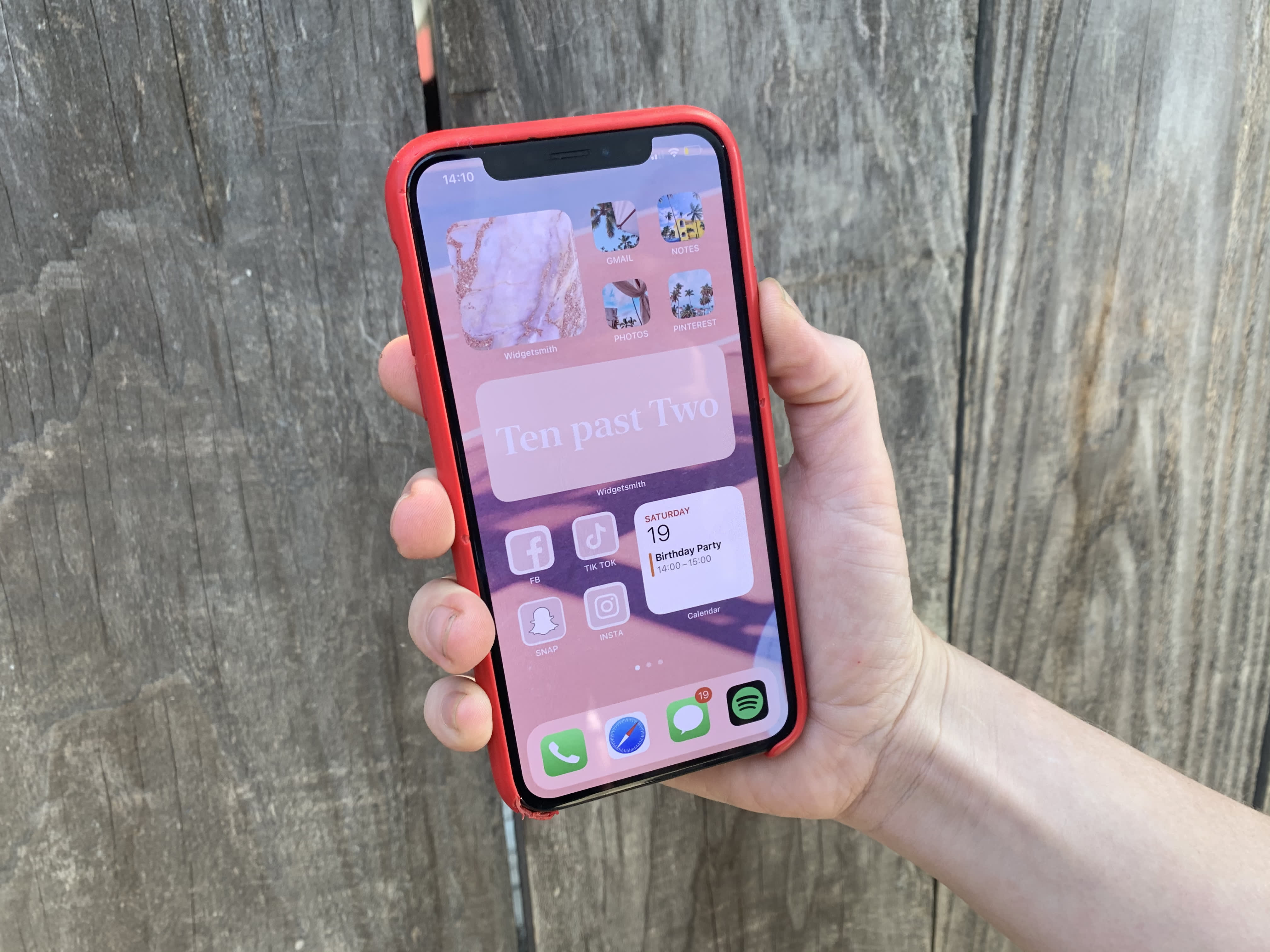iPhone users can now customize their homescreens with colorful widgets and app icons.
Kif Leswing/CNBC
iPhone users are using the latest iOS update to customize their home screen with new icons, photo boxes, and even entire color schemes.
The new iOS options match features long available for Android devices, which typically allow users to change nearly everything about the software’s appearance. Prior to iOS 14, iPhone users were forced to have their apps in a grid of boxes.
But now, using a new widget feature in iOS 14 and a creative workaround using the Apple-made Shortcuts app, users can change the appearance of their icons, and basically make the iPhone’s home screen look completely different.
Over the weekend, iPhone customization went viral. One video titled “How to make your iOS 14 home screen aesthetic AF” had over 24 million views on TikTok on Monday.
“I knew I needed to hop on as soon as iOS 14 launched,” said Katarina Mogus, who made the video and is the founder of En Flique Creative, a company that advises brands on how to stand out on social media. “I was sitting in my room thinking, you know what, I love this, I’m just going to share it with everyone and teach other people how to make this look really cute as well.”
She said she knew her followers would appreciate the video because they’re typically interested in customization. Other iPhone customization tutorials she posted over the weekend have millions of views, too.
The customization craze is driving downloads: On Monday, Widgetsmith, an app used by Mogus, was the top free app on Apple’s App Store in the United States. David Smith, the app’s developer, tweeted on Friday that “Widgetsmith went viral on TikTok, which is a phase I don’t even understand but is having a rather robust result on my life right now.”
Widgetsmith has a free basic version, or costs $2 per month or $20 per year for a premium version with additional features. Photo Widget, a similar app for displaying photos on the home screen, was the top paid app. It costs $0.99 to download. Since Widgetsmith was launched on September 16 alongside iOS 14, it’s been downloaded over 2 million times, according to an estimate from Sensor Tower, an app analytics firm.
Combining Widgetsmith with Color Widgets, the No. 2 free app on Monday, and Photo Widget, the No 3 free app, widget apps have been installed about 5 million times since iOS 14 was released on Sept. 16, generating hundreds of thousands of dollars of sales, according to Sensor Tower’s estimate. About 38% of the downloads have been in the United States.
Mogus doesn’t have business relationships with widget app makers, but she is also capitalizing on the home screen customization trend with an Etsy store, where she sells digital images and wallpaper for iPhone customizers.
Why now?
There are two main reasons why significant device customization is taking off for iPhones.
First, iOS 14 introduced widgets, interactive modules you can place on your home screen to display automatically updating information, like a weather forecast or your schedule.
But iPhone users like Mogus have customized widgets for primarily visual purposes, using apps like Widgetsmith and Photo Widgets to display photos or inspirational text, color-coordinate parts of the home screen, and make their home screens “aesthetic AF.”
Second is renewed attention to a feature that’s been around a couple of years: Shortcuts. Originally launched in 2018, this Apple app enables savvy users to create scripts on an iPhone to automate common tasks. Users can make a shortcut to turn on music and connected smart lights every morning at the same time, for example. When a shortcut is completed, users can place an app icon on their home screen to quickly run it.
But customization fanatics are using Shortcuts to change app icons. Although some apps do allow the user to change their icon — on MLB At Bat, you can change the icon to your favorite team, for example — the Shortcuts app enables users to change any icon to whatever they like.
Basically, users create a shortcut that does one thing: open up an app, like Spotify, Messages, or Netflix. Then they can change the icon and name for that shortcut to whatever they’d like. Customizers are using this feature to replace all the icons on their home screen.
While users have been able to add their own custom icons since Shortcuts first launched, the combination with the new widgets feature has enabled a significantly higher degree of customization than was possible in the past.
Tips for making your home screen aesthetic AF
While Mogus’ designs use a cute and feminine style, she says she’s received requests to create iPhone tutorials for different looks, such as a minimal theme or more masculine color schemes.
Other people are taking customization to the next level.
One person remade all of his app icons so they looked like an amateur made them in Microsoft Paint:
Another person shared an iPhone screen designed to look like Windows 95:
If you’d like to customize your own home screen, first you’ll need the latest version of iOS for the widgets feature as well as the Shortcuts app, which can be downloaded for the app store.
Beyond that, if you want your iPhone home screen to look great, you’ll have to sweat the details.
“Think of it as a big picture, make sure you take into consideration your background and the screensaver. All the widgets and little photos, and even the fonts, they do make a big impact when you’re talking design and creativity. So if you add in a photo of you and your friend, make sure it’s edited the same way as the widgets are so it’s all very cohesive,” Mogus said.
